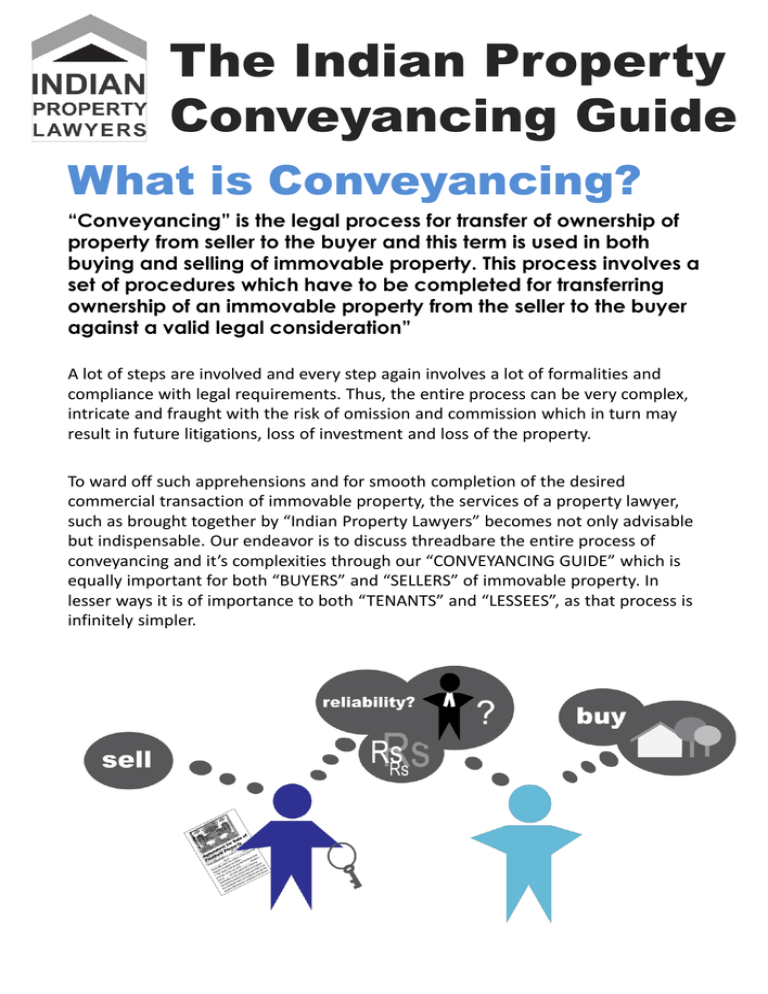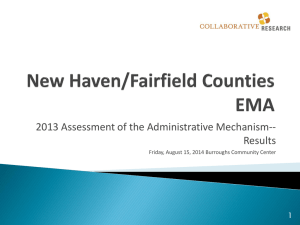IPL-Conveyancing-Guide
advertisement

The Indian Property Conveyancing Guide What is Conveyancing? “Conveyancing” is the legal process for transfer of ownership of property from seller to the buyer and this term is used in both buying and selling of immovable property. This process involves a set of procedures which have to be completed for transferring ownership of an immovable property from the seller to the buyer against a valid legal consideration” A lot of steps are involved and every step again involves a lot of formalities and compliance with legal requirements. Thus, the entire process can be very complex, intricate and fraught with the risk of omission and commission which in turn may result in future litigations, loss of investment and loss of the property. To ward off such apprehensions and for smooth completion of the desired commercial transaction of immovable property, the services of a property lawyer, such as brought together by “Indian Property Lawyers” becomes not only advisable but indispensable. Our endeavor is to discuss threadbare the entire process of conveyancing and it’s complexities through our “CONVEYANCING GUIDE” which is equally important for both “BUYERS” and “SELLERS” of immovable property. In lesser ways it is of importance to both “TENANTS” and “LESSEES”, as that process is infinitely simpler. The Indian Property Conveyancing Guide Conveyancing for the Property Buyer Steps and Requirements of Conveyancing in “BUY” transactions 1. Searches for clear and transferable title of the proposed property. A person cannot transfer a better title than he / she himself / herself enjoys. This aspect can be taken care of by perusal of the “Mother Deed” and subsequent searches, based on the information contained in the mother deed. Searches are made with the various govt. bodies / offices such as Public Index in the Municipal office, Local registration office, Collectorate, Court, Land reform office, Land Revenue office, etc. to confirm that the present seller is the real owner and is entitled to transfer the ownership rights in the property, and the property is not charged against any financial liability. 2. Searches for Requisition, Acquisition, Encumbrance and charges Based on the identification information in the mother deed, searches have to be made with Land acquisition office, Improvement trust and Land Reforms and Land Revenue office, etc to ascertain that the concerned property, if it is a plot of land, is not under any notice of requisition / acquisition, and the property is not subject to any encumbrance, attachment or any other charges. Encumbrance / charge means some type of lien in favour of somebody / agency / authority against any dues / obligation / commitment. Generally such charges are created for availing loans by creating a mortgage on the property either as principal security or as a collateral security. Right title and interest in an encumbered / charged property cannot be transferred unless the charge is released. This exercise is a must in all cases of property transaction. The Indian Property Conveyancing Guide Conveyancing for the Property Buyer 3. Searches for statutory approvals:If the property to be purchased is an apartment, constructed / being constructed on a plot of land developed by a real estate developer, then it must be ensured that all the necessary approvals have been obtained from the relevant authorities for the project. Some of the most important approvals required for the proper and hassle free development of a project and smooth transfer thereof to the proposed transferee are site plan sanctioned by appropriate authority / civic body; Government agencies such as land development authority, planning authority; environmental clearance authority, Income tax clearance etc. These approvals differ from case to case basis and are required wherever applicable. Physical verification of the original documents and certificates must be done to ensure statutory approvals have been obtained and are valid. Close scrutiny of the reasons leading to the inordinate delay, abandonment, protracted legal battles, pertaining to the projects under construction reveal that in most of the cases the root cause of the projects being delayed / stalled / litigated is violation of the sanctioned site plan, non-approval by relevant authority / agency or obtaining approval by misrepresentation / suppression of facts. 4. Dealing with property involving “Power of Attorney” The property in question might have been developed / being developed by real estate developers under POA, on plots of land belonging to different land owners (which is the case in most of the instances at present) OR the property might have been / being sold by the seller in fiduciary capacity under POA in cases of auction sale. In all these cases the POA, ownership right of the Principal, the charge documents etc. must be carefully perused and ascertained that all the legal requirements in such cases have been duly complied with. 5. Preparation of the sale agreement To allow time for completion of the project (if under construction) or arrangement of funds by the buyer (loan etc.) the seller and buyer enter into a “Sale Agreement” pending registration of the final agreement. It’s a document in writing and prepared on a Non-judicial stamp paper. The Sale agreement contains all the relevant details with regards to the proper and complete identification of the property, Seller and Buyer involved in the transaction. It also contains the detailed terms and conditions such as consideration, schedule of property along with attached easements and inherent rights to common amenities, completion schedule, penalty for delay in payment and termination of agreement charges etc. Sale agreement is the nucleus of the final conveyance deed hence is to be prepared with utmost care. After execution of the Sale agreement by both the parties, it becomes legally binding for both the buyers and sellers to perform as per terms and conditions laid out in the agreement. Non performance / noncompliance with the terms and conditions of the Sale agreement amounts to breach of contract and becomes liable to be dealt with under Specific Performance Act. Sale agreement is the base / primary legal document on the basis of which all the parties involved in the transaction, including lender(s), deal upon. By now the importance of the Sale agreement is amply clear and needless to say such an important document must be prepared by and only by competent and expert legal professionals such as those brought together by Indian Property Lawyers. The Indian Property Conveyancing Guide Conveyancing for the Property Buyer 6. Preparation of Draft Conveyance Deed At the appropriate time of registration as stipulated in the Sale Agreement and by mutual consent of the parties, a draft of the final conveyance deed is prepared for approval of all the parties involved in the transaction. It must be ensured that the identification of the property, seller and buyer and all other terms of transaction are the same as mentioned in the Sale agreement. Any variation in any of the terms and conditions must be by mutual consent of the parties. It must be ensured that there is no error of any nature including typing error. 7. Preparing Final Conveyance Deed on Non-judicial stamp paper, Execution & Registration Non-judicial stamp paper, of appropriate value commensurate to the value of the property at the rate of stamp duty prevailing at the place where the property is purchased (Stamp duty being state matter the rate differs from state to state) is purchased and the Final Conveyance Deed is prepared as per the corrected “Draft”. It is executed by the concerned parties and is also witnessed by at least 2 witnesses, and then the document is presented to the Registrar’s office having jurisdiction over the area, for registration. After completion of the process of registration, a paper token called IGR (Index General Register) is supplied by the Registry office, and on production of the same the original Conveyance Deed, duly registered, is delivered to the bearer of the token, when the deed is ready for delivery. 8. Mutation It is a process by which the name of the property buyer is entered as owner of the concerned property in the records of the local Municipal office/ Panchayat office and collectorate office. After completion of the transaction of sale and purchase as detailed above, the property buyer must get the property mutated in his / her name as it substantiates the ownership rights over the said property. Thus the transaction for “BUY”, after completion of all the above procedures and inherent steps, is deemed to have been completed, and the entire process is collectively termed as “CONVEYANCING”. Though it’s true that all the above aspect s need to be tackled with utmost care, because even a minor lapse may send the entire deal and it’s after effect upside down. This is where the role of a professional conveyancer like “IndianPropertyLawyers.com” into play and importance / indispensability of the services rendered by us can be underscored. The Indian Property Conveyancing Guide Conveyancing for the Property Seller Steps and Requirements of Conveyancing for SELLERS It is a very misplaced notion amongst the seller(s) of the property that selling a property is disposing off (not creating) an asset and does not require the services of a lawyer to oversee the transaction on their behalf. A seller also needs the services of a property lawyer to safeguard his /her interest and protect his /her asset from being eroded, which may be caused in the form of and by any /combination of factors as given below: 1. Wrong description of Property:- The “Sale Agreement” as detailed above may be doctored to contain a wrong description / identification of the property than the one intended to be sold by the seller. The property mentioned in the sale agreement may be changed, to other prime property capable of fetching much more price, than the agreed price. This may cause immense loss to the seller and to avoid the loss the seller may have to undergo litigation and could result in heavy fees. 2. Wrong measurement of the property under sale:- Similarly the area of the land intended and agreed to be sold may be intentionally inflated in the sale agreement. If the same is not detected and corrected before execution of the agreement, will again cause huge financial loss to the seller and to avoid the loss the seller may have to undergo litigation, which again will could result in a loss. The Indian Property Conveyancing Guide Conveyancing for the Property Seller 3. Wrong selling price:- The agreed selling price / rate may be reduced substantially in the sale agreement which again if not detected and corrected in time, may cause huge financial loss to the seller and to avoid the loss he/ she may have to undergo litigation which again will could result in a loss. 4. Variation in terms & conditions:- The terms and conditions as agreed for the sale transaction may, while preparing the “Sale agreement”, be intentionally and willfully twisted and made more favorable to the buyer at the cost of the seller. Such surreptitious moves by the proposed buyer must be detected and corrected in time, to prevent loss to the seller. 5. Errors in the Final Conveyance Deed:- All / some or any of the aforesaid errors may be intentionally and willfully made in the final conveyance deed, though they might have been correctly mentioned in the “Sale agreement”. The errors, if not detected and corrected before the execution and registration of the deed, will cause financial losses and protracted litigation to the seller. 6. Non adherence to the time schedule:- If the time schedule for completion of the deal as agreed upon is wrongly mentioned in the sale agreement to make it favourable to the buyer then the seller stands to loose. Suppose if the closure of the deal goes beyond the time fixed for closure of the deal by 3 months then receipt of the sale proceeds or a part thereof, by the seller is also delayed by 3 months and the seller stands to loose the interest on that amount for 3 months. The loss may be severe in terms of loss of opportunity if the sale proceed was targeted to have been invested in any other time bound investment scheme. A property lawyer like those brought together by “IndianPropertyLawyers.com” will take care of this aspect by sending timely legal notice(s) to and advising the buyer of the consequences of violation of the time schedule. The Indian Property Conveyancing Guide Online and Offline Conveyancing The complexities of the entire process of conveyancing, consequences of even minor lapses in the process and the time required for persuasion and smooth completion can be easily assessed and this assessment in turn establishes the indispensability of an expert and professional conveyancer. These professional conveyancers are available both offline and online with their respective advantages and disadvantages which are discussed in detail herein below, for you to compare, judge and opt for the option which suits you most. Offline Conveyancing: is done by property lawyer(s)/ advocates engaged in the legal profession in various courts of law. Finding a good property lawyer is always a challenge and we end up relying on friendly advice of friends and family to choose one. In some cases conveyancing is not their primary / standalone profession rather it’s a secondary / ancillary profession for them. Whether or not a particular lawyer/legal professional accepts a conveyancing assignment at a particular time depends on his / her engagement in their primary area of expertise. Upon acceptance of the assignment, all the related documents / papers are handed over to the lawyer by the party (Buyer or Seller) and for all the subsequent details / developments the party has to communicate / interact with the lawyer for further discussions and / or furnish further details / information as and when required. Thus till conclusion of the deal the party / employee / representative may be required to visit the lawyer on innumerable occasions or keep calling to track the progress of their transaction. Online Conveyancing IndianPropertyLawyers.com have built a platform for property lawyers to deliver such services, keeping in mind the ease and comforts of the property buyers and sellers. The entire transaction can be done through this online platform, including • Online Tracking: Stepwise developments and progress of the transaction • Communicating with your lawyer 24/7: may be done through the online platform 24/7; allowing a trail of written communication to minimize errors • A more efficient process - Personal visit by the property buyer or seller to the legal professional is totally dispensed away with in this user-friendly online conveyancing. Till date, in the Indian property market the entire conveyancing transaction was carried out offline. The online conveyancing proposition has been conceptualized and materialized by “IndianPropertyLawyers.com” after extensive research and comprehensive market survey. Since the introduction of this user-friendly online service, people have started feeling the difference and now more and more people are opting for online conveyancing. The property buyer or seller, based upon their criteria, has the option to choose from a vast pool of competent property lawyers. It allows for complete transparency and accountability of service. The entire process is amazingly user friendly and easy to operate that it does not need any guidance at all. You may satisfy yourself by posting your enquiry here. The Indian Property Conveyancing Guide Comparison Between Online and Offline Conveyancing The Indian Property Conveyancing Guide The Property Buyers’/Sellers’ Glossary of Legal Terms Acquisition and Requisition:- Property under notice of acquisition / requisition by Govt. bodies, Quasi Govt. bodies, Public utility services such as PWD etc for public purposes. Agreement:- Terms and conditions mutually agreed upon by the parties concerned for performance of a contract. Breach of Contract:- Non-compliance with and /or violation of certain/all terms and conditions as mentioned in the agreement. The aggrieved party may seek legal recourse for performance of the contract by the violator. Caveat Emptor:- The buyer is required to know the condition of the property himself, may avail the services of a surveyor for the purpose. Charge against property:- Charge in the form of a mortgage against the immovable property, created by the owner in favour of the lender /financier for availing of financial assistance. Consideration:- The value of the property agreed by and between the parties (buyer and seller; mortgager and mortgagee) to be paid by the buyer. Contract :- The same as “Agreement”. Conveyance:- Preparation of the Sale Deed or the document by which the ownership rights in an immovable property is transferred from the seller to the buyer for a valid consideration. This involves preparation and execution of a conveyance / Sale deed to be executed by all the parties involved. After execution the said document is required to be registered to complete the process of conveyance. Conveyancing:- The process by which, the “Conveyance” as above, is affected and legal ownership in the property is transferred from the seller to the buyer. Conveyancer :- Legal professional(s) who carry out conveyancing. Covenant:- The expressed terms and conditions binding the parties to a contract. In other words the rights and responsibilities OR obligations and restrictions of the parties. Easements:- Facilities attached with the property under transfer. Encumbrance:- Charge in the form of a mortgage is created against the property for raising fund and the property is said to be encumbered. The Indian Property Conveyancing Guide The Property Buyers’/Sellers’ Glossary of Legal Terms Equitable mortgage:- Creation of charge in an immovable property in the form of a simple mortgage by deposit of title deed without any other legal formalities. Freehold property:- Property free of any charge against it. Owner enjoys absolute right to sell or charge the property at any point of time. Leasehold Property:- The occupier buys the right to occupy / use the property up to a certain period of time. Legal mortgage:- Where charge is created in immovable property by executing a mortgage deed and the same is registered. Mutation:- Recording the name of the buyer / transferee in the records of the local civic bodies / Land revenue office / Panchayat etc. Partition Deed:- The document which contains the details of the partition of the family property amongst the members of the family. It is authenticated by all the members of the family. It may or may not be registered but carries legal enforceability. Searches:- The free and unambiguous right, title and interest of the transferor is ascertained by searching the documents at collector ate, sub-registry office, Land revenue office etc. Stamp duty:- Cost of the stamp paper which is payable to the state exchequer at the rate prescribed by respective states for transfer of property ownership. Title Deed :- It is the “Record of Right” which establishes the ownership of the property. Transfer Deed:- The legal document which establishes transfer of interest from one person to another. Transferor:- Who transfers the right. Transferee :- Who gets the right after transfer. Note:- This is only an information document and not legal advice










